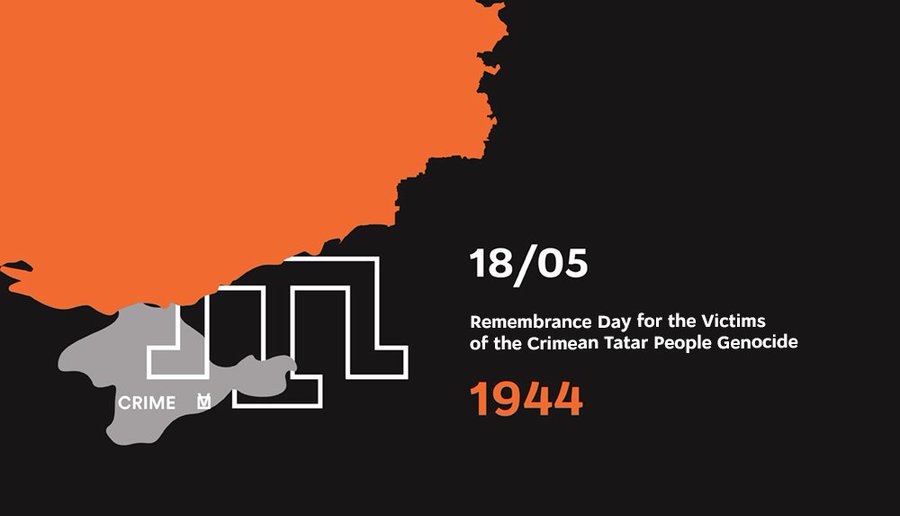By Marco Levytsky
Editorial Writer
Last month, on May 18, the world marked a little-known crime against humanity. It may be little known but the Day of Remembrance of the Genocide of the Crimean Tatar People is extremely relevant towards the understanding what’s behind the Russian annexation of the peninsula. Known in the Tatar language as Sürgünlik it commemorates the forced deportation of the Tatar people from their historic homeland by Soviet Dictator Joseph Stalin.
It was on that day in 1944 that the terror began. A 32,000-strong NKVD special force rounded up Crimean Tatars for deportation. They were loaded onto trucks, taken in convoys to Simferopol and Bakhchysaray and were then reloaded into cattle cars for transport to the Central Asian steppes. Crimean Tatars who lived in mountainous regions inaccessible to NKVD trucks were rounded up and shot. The inhabitants of the Arabat Spit, a group of inaccessible fishing villages, were herded onto a barge which was then towed into the Azov Sea and scuttled. A nearby boat with Soviet machine gunners made sure that no one survived.
Within three days, there were no more Crimean Tatars, or as Communist officials in Moscow stated, they had “created a new Crimea according to Russian order.” Crimean Tatar books were burned. All Crimean Tatar towns and villages were given Russian names, and Muslim cemeteries and mosques were razed. Stalin ordered the editors of the Great Soviet Encyclopedia to remove all references to the Crimean Tatars, in effect, erasing them from history.
Crimea was cleansed of over 200,000 Tatars. The next four weeks witnessed a procession of lingering death as thousands of railway cattle cars crammed with people travelled 4,000 kilometres across the scorching steppes of Central Asia. The Crimeans called them “crematoria on wheels.” They died of suffocation, hunger and thirst. A trail of decomposing bodies lay along the railroad tracks; close to 30,000 of the human cargo, perished. Approximately half subsequently died of hunger and disease in the Central Asian steppes, hidden from the eyes of the world in the midst of World War II.
An intense campaign of detatarization followed to try to erase the remaining traces of Crimean Tatar existence. By the end of the deportation, not a single Crimean Tatar was left on Crimea. The deportation of the Tatars has been recognized as an act of genocide by four countries – Ukraine, Canada, Latvia and Lithuania.
In 1956, the new Soviet leader Nikita Khrushchev condemned Stalin’s policies, including the deportation of various ethnic groups, but did not lift the directive forbidding the return of the Crimean Tatars despite allowing most other deported peoples to return. The Crimean Tatars remained in Central Asia for several more decades until the perestroika era in the late 1980s, when 260,000 Crimean Tatars returned to Crimea.
Crimean Tatars were recognised as an indigenous people by the 1996 Constitution of Ukraine, and granted a limited number of seats in the 1994 Crimean parliamentary election. Nonetheless, they faced constant discrimination from the authorities of the Autonomous Republic of Crimea, which was primarily governed by ethnic Russians and directed towards Russian interests. Under the presidency of Viktor Yushchenko, increased attention was paid to Crimean Tatars, with trials for crimes against humanity beginning for those involved in the deportations. However, issues of land failed to be resolved.
Following Russia’s occupation of Crimea in 2014 and its full-scale invasion of Ukraine in February 2022, Russian Dictator Vladimir Putin has taken over Stalin’s unfinished business. Today, the Crimean Tatar people, who are bravely resisting the Russian occupation of their ancestral homeland, are once again subject to systemic repressions, arbitrary arrests and attacks on their inalienable rights and freedoms by the Russian occupation regime. The Representative Assembly of the Crimean Tatar People, the Mejlis, has been illegally banned. Crimea has effectively become an immense open-air prison and a site for concealing Russian crimes.
Prior to the 18th century the Crimean Tatar’s had their own state under the protection of the Ottoman Empire – the Crimean Khanate, which was annexed by the Russians in 1783. The removal of Crimea’s indigenous people began almost immediately. In total, from 1783 till the beginning of the 20th century, at least 800,000 Tatars left Crimea. As in the case of the Holodomor famine-genocide in Ukraine, Russian settlers were brought in to fill the void. That’s how Crimea became “Russian”.
And it is for this reason that Crimea has become the most contentious issue when it come to maintaining Ukraine’s territorial integrity. Too many people in the world still fall for centuries-old Russian propaganda that claims the peninsula as an integral part of Russia. It is a claim that is based upon an ongoing policy of ethnic cleansing and genocide.
To say that Ukraine should disavow its rightful claim to Crimea is not only a rejection of the international order, a rejection of the United Nations Charter and a violation of the Budapest memorandum under which Ukraine voluntarily surrendered what, at the time, was the world’s third largest nuclear arsenal, but also an acceptance of the continuous Russian policy of destroying the Crimean Tatars as a nation.
Should Crimea remain in Russian hands, not only will the free world turn a blind eye to the historic and current Russian subjugation and devastation of the indigenous people of Crimea, but it will leave the door open to their ultimate annihilation by the Russian occupiers.
Share on Social Media




































